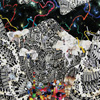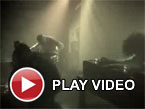Ensemble Economique, "Crossing The Pass, By Torchlight"

Brian Pyle received a lot of attention with 2010's Psychical (a creepy homage to schlocky slasher films), but it was much too blunt and raw for me to want to hear more than once.  He got me this time though: Crossing The Pass, By Torchlight traffics in similarly eerie and disquieting ambiance (and continues to display Pyle's love of '80s sounds and textures), but it does so in a much deeper and more nuanced way.  That may not sound like a stunning evolution, but the difference is a dramatic one.  This is a great album.
The word "cinematic" is probably unavoidable in any discussion of Crossing The Pass, By Torchlight, as most of the six songs are tense and brooding in a way that screams "film soundtrack."  Unfortunately, the word "cinematic" is a somewhat negatively loaded term, as it it is often used as a charitable way to describe music that doesn't quite stand on its own without a visual component.  This album is cinematic in the best, most Angelo Badalamenti-esque sense though: it easily stands as a complete and satisfying whole.  It would certainly be great to hear Pyle's brooding and throbbing synths accompanying a film, but it would have to be a brilliantly dark and sophisticated film to do it justice.
The more fascinating aspects of Crossing The Pass are the less immediately obvious ones.  The most significant is Brian's irony-free use of dated tropes like clunky drum machine rhythms, '80s synth textures, and movie dialogue snippets.  Taken out of context, it is easy to imagine New Edition rapping over the beat in "Sparks Exploding, Splintering Blackness," but it becomes a very haunting piece when that beat is ensconced in Pyle's lush and buzzing layers of synthesizers.  That again brings Badalamenti to mind, as he and David Lynch are the reigning masters at creating perverse dread from seemingly incongruously kitsch.  Pyle hasn't eclipsed the Twin Peaks soundtrack or anything here, but he seems to be equally unerring and pitch-perfect in that very specific department.
The second most striking aspect of this album is its deceptive simplicity: all of these songs essentially stretch one strong motif into an entire song. There aren't distinct movements or multiple parts in any of these pieces, yet they feel like very complex, dynamic, and deliberate compositions.  Pyle doesn't need much more than a solid rhythm and a brooding chord progression to create a memsmerizing piece, as his greatest talent lies in masterfully tweaking everything in the periphery.  Regardless of how a song starts, it always ultimately snowballs into something much darker and more dense as layers and layers of feedback, synthesizer, strangled guitars, and samples are added.  To his credit, Brian is varied enough in his approach to avoid ever seeming formulaic or predictable–it is a definite that the songs here will start off good and end even better, but it is still always compelling to hear how he gets there.
It is extremely difficult to pick a favorite or least favorite song on this album, as it is uniformly excellent from start to finish.  The most immediately gratifying piece, however, is probably "To Feel The Night As It Really Is," due to its infectious drum loop, which makes its slow-burning intensity seem a bit more vibrant than usual.  If Crossing The Pass has a flaw, it's probably that "Everything I Have, I Give To You" is too warm, non-threatening, and comparatively minimal to comfortably fit thematically with the rest of the album.  It is still quite a likable piece though–it just feels more like a good bonus track than part of the formal album.  That, remarkably, is the most serious misstep on a virtually flawless album.  I cannot over-emphasize what a huge leap forward this record is for Ensemble Economique: this is definitely one of my favorite albums of the year and quite possibly the most pleasantly surprising one as well.
Samples:
- To Feel The Night As It Really Is
- Everything I Have, I Give To You
- Sparks Exploding, Splintering Blackness
 




